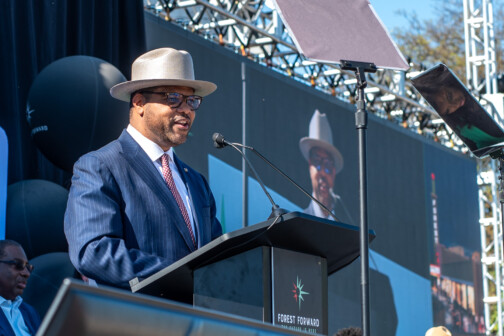The Texas Legislature will close its 88th session Monday, and with several priority pieces of legislation all but dead, it seems guaranteed that lawmakers will remain in Austin for a special session.
If you’re having a hard time following the whirlwind of activity this week, it is because things are happening a frenetic pace, often late at night. The Senate and House have dueling school finance bills that are diametrically opposed in intent, making it a near-certainty that Gov. Greg Abbott will call a special session—but that was expected.
Other bills that have been queued up for votes or debate are also dying or dead. At this point, if a bill hasn’t made it out of committee, it’s dead. If it hasn’t had a first reading on the house floor, it’s dead.
What is being hammered out from now through Sunday are the differences in bills that originated in the House and had amendments in the Senate—and vice versa—as well as bills that passed both chambers but emerged with substantial changes.
For instance, this week the Senate sent the House its changes to House Bill 100, a school finance bill that included raises for teachers and added a provision for vouchers, which has been a nonstarter in the House. In turn, the House sent the Senate its changes to Senate Bill 9, a school finance bill that gave teachers a one-time $2,000 bonus and also paid teachers in smaller districts an additional $6,000. The House sent it back with 10 additional amendments, some of which came from bills that died in committee.
Those bills, loaded with poison pills, will go back to their respective bodies to be debated and voted on as the clock runs out.
Much of this week will be spent in an exercise called chubbing, which happens when legislators spend an inordinate amount of time debating bills to slow down the process. Often, lawmakers will chub lower priority bills placed earlier in the calendar, hoping to run the clock out before the more controversial bills come up.
And that’s largely what happened to a set of bills affordable housing advocates hoped would push cities to loosen restrictions on lot sizes, setbacks, and apartment building height. They sat in a queue that didn’t move much before midnight struck, leaving them behind.
SB 1787 would have blocked ordinances that require residential lots to be larger than 2,500 square feet, wider than 16 feet, or deeper than 30 feet. Its goal was to encourage building housing on smaller lot sizes, boosting inventory in cities that desperately need it. SB 491 would have prevented cities from limiting the height of apartment buildings based on the lot’s proximity to another lot that is more than 50 feet away.
Both measures were touted by affordable housing advocates as a way to increase housing stock while also improving affordability. The idea was to allow developers to build slightly taller structures that could contain more units on the same lot. Reducing rules around how much land is needed to build a house would also improve affordability, they argued.
Another bill, SB 1412, would have allowed accessory dwelling units (ADUs) like garage apartments and granny flats in single-family zoning by right, effectively handcuffing local governments from blocking such things. It also establishments limitations on how a city can regulate ADUs.
That bill was debated and voted on, but narrowly failed to pass. What flummoxed many advocates was the nay votes from legislators they normally expect to be pro-housing: urban Democrats. For instance, state Rep. John Bryant, who represents a swath of East Dallas, argued vehemently against the bill, warning that it could subject neighbors to living next to “a one-room hotel.” He argued that an entity could rent out several ADUs and then sublet those units as short-term rentals to visitors.
“This is a matter for local zoning ordinances,” he insisted, adding that cities should be able to regulate zoning “according to their own needs.”
State Rep. Carl Sherman (D-DeSoto) also opposed the bill, calling it “dangerous,” pointing to concerns about infrastructure changes that might not support additional density.
“I know we want to make more money, but not this way,” he said.
A sponsor of the bill, state Rep. Justin Holland (R-Rockwall) defended his work, saying that it afforded homeowners the right to decide how their property is used while expanding workforce housing options.
“Homeowners associations, historical districts, and deed restrictions supersede this law,” he said. “This bill does not supersede any short-term rental policies.”
Indeed, the most recent version of the bill does seem to establish several carveouts for cities to still regulate ADUs. Dallas’ current ordinance requires that neighborhoods opt-in to allow ADUs. SB 1412 would have eliminated that provision, freeing homeowners to build them by-right.
But some of the context clues may also provide another reason for the opposition. State Rep. Donna Howard (D-Austin) took to Twitter Tuesday night to explain. “Understand your disappointment and frustration in light of need for more affordable housing,” she wrote to a constituent, adding that the Democrats felt a need to push back on “historic efforts to consolidate power at the state level and erode local democratic decision-making.”
Howard pointed to bills like HB 2127, which remove the power of local governments to craft tailored policies around things like labor practices, minimum wages, sexually-oriented businesses, and the environment. That bill is headed for Abbott’s desk.
For Dallas, this means that ordinances that require water breaks for construction workers and a recently-passed ordinance banning the sale of animals at pet stores will become unenforceable. Ordinances addressing eviction protections, placement of concrete batch plants, strip club regulations, and leave policy for city employees could also be impacted.
HB 2665, which originally prohibited cities from passing STR bans, was dramatically altered earlier this month to create a task force to study the matter. That bill is dead, and it is not believed that HB 2127 impacts city or town development code, likely leaving Dallas, Plano, and other cities free to consider a ban.
Given the uncertainty around many priority bills (and how many are now dead), Monday’s adjournment will likely bring little clarity. Abbott hasn’t indicated when he will call a special session. State law allows him to do so at any time, on any subject, but the special session is limited to whatever subject or subjects he chooses.
Given the sheer number of bills that failed to complete the legislative process this session, there’s a slim chance that ADUs, lot sizes, and other measures that failed in the regular session could be up for discussion again. But that depends on how broadly Abbott words his announcement.
The last day of the regular session is Monday, and only corrections to bills can be considered. June 18 marks the last day the governor can sign or veto bills passed during this session. Affordable housing legislation will likely have to wait another two years.
Author






